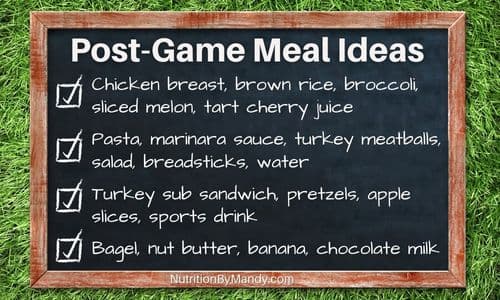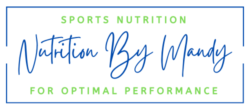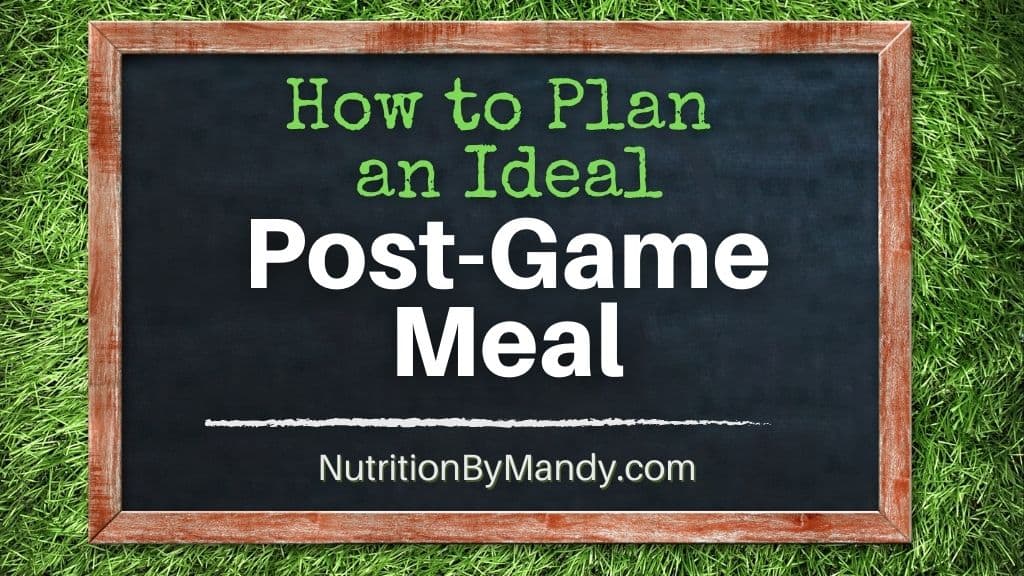How to Plan an Ideal Post-Game Meal for Athletes
Following a competition, it is important for athletes to know what to eat in their post-game meal to support their recovery nutrition needs.
Let’s explore the key nutrients athletes should include in their post-game meal. Then we will look at ideas for post-game meals athletes can prepare at home or enjoy at restaurants.
Key Nutrients in a Post-Game Meal for Athletes
When planning a post-game meal, there are three key concepts athletes should keep in mind to support recovery:
- Rehydrate – Replace fluid and electrolytes lost in sweat
- Refill Energy Stores – Consume carbohydrates to replace energy stores used during activity
- Build and Repair – Consume protein to help build and repair lean muscle mass

Hydration with the Post-Game Meal
Following a game, it is important for athletes to rehydrate and replace the fluid and electrolytes lost in sweat.
If athletes do not consume adequate fluid and electrolytes following a game, they will start the next game or workout in a dehydrated state.
Dehydration can have a negative impact on both health and performance; thus, rehydrating following a game is important.
To determine your individual fluid replacement needs you can calculate your sweat rate prior to competition.
This is done by weighing yourself before and after the activity to determine your change in body weight. The change in body weight reflects fluid loss in sweat.
Calculating Sweat Rate
The Gatorade Sports Science Institute has an online Fluid Loss Calculator that can help athletes calculate hourly sweat rate during exercise.
Keep in mind the amount you sweat will vary based upon several factors, including:
- Type of exercise
- Exercise intensity
- Uniform and equipment worn
- Temperature and humidity
When calculating your sweat rate for competition, make sure to do so in an environment as close to the actual competition as possible.
Replacing Fluid Loss
Following the game, you can determine the amount of fluid to consume based on how many minutes you played.
To replace fluid lost in sweat, you need to drink more fluid than the amount lost in sweat (1). For example, for each pound of body weight lost during the activity, you should aim to drink ~20-24 oz (2.5-3 cups) of fluid.
When you have limited time before your next game, replacing this fluid is especially important to ensure you start your next workout in a hydrated state.
Replacing Electrolytes
In addition to fluid, athletes lose electrolytes when they sweat.
The main electrolyte lost in sweat is sodium. Thus, including sodium in the post-game meal can help with replacing sweat losses from activity.
In addition, consuming sodium with the meal will stimulate thirst and help your body retain the fluid you drink with the meal (2).
Consider adding the following items to the post-game meal to help increase sodium content of the meal.
- Broth-based soups
- Vegetable juice
- Deli meat
- Cheese, cottage cheese
- Pretzels, baked chips, pita chips
- Salted nuts and seeds
- Pickles, relish, olives, capers
- Condiments: Ketchup, barbecue sauce, mustard, soy sauce, salad dressing
*Note: Talk with your doctor or a ssports dietitian nutritionist about staying hydrated if you are on a low-sodium diet or are required to limit your fluid or sodium intake.

What About Sports Drinks?
Sports drinks can also be a convenient option for helping athletes replace both fluids and electrolytes following a game.
Many sports drinks are formulated to contain carbohydrates, sodium, and a small amount of potassium (2). Thus, consuming sports drinks with the post-game meal can help athletes with meeting their recovery nutrition needs.
Carbohydrates with the Post-Game Meal
Carbohydrates provide the body with the energy needed to perform at its best.
During activity, the body’s stores of carbohydrates become depleted. Therefore, consuming carbohydrates with the post-game meal is important to help replenish these stores.
Following exercise, it is recommended that athletes consume 1-1.2 grams of carbohydrate per kilogram body weight for the first 4 hours after activity (1). For a 165-pound athlete, this would be 75 – 90 grams of carbohydrates.
Ideas for Adding Carbohydrates
Athletes can easily add carbohydrates to their post-game meal with fruit, starchy vegetables, grains (bread, pasta, rice, cereal), milk, and yogurt.
Here are several ideas for adding carbohydrates to your meal.
- Large Bagel: 45 -60 grams of carbohydrates
- Banana: ~30 grams of carbohydrates
- Brown Rice (1 cup): ~45 grams of carbohydrates
- Quinoa (1 cup): ~40 grams of carbohydrates
- Pasta (1 cup): ~40-45 grams of carbohydrates
- Sweet Potato (medium): ~30-35 grams of carbohydrates
- Chocolate Milk (1 cup): ~28 grams of carbohydrates
- Tart cherry juice (1 cup): ~25-30 grams of carbohydrates
By combining a variety of carbohydrate-rich foods in the meal, athletes can easily meet their recovery nutrition needs.
Protein with the Post-Game Meal
Including protein in the post-game meal is important to support the repair and building of lean muscle mass.
Following activity, it is recommended athletes aim to consume ~0.25 grams of protein per kilogram body weight (1, 3).
This calculates to be in the range of 20-40 grams of protein for most athletes, with larger athletes needing more protein than smaller athletes.
Athletes can easily meet their post-game protein needs with whole foods.
In general, one ounce of meat, pork, chicken, turkey, or fish provides ~7 grams of protein. Thus, consuming ~4-5 oz of lean protein with the post-game meal can help athletes with meeting their recovery nutrition needs.
Ideas for Adding Protein
Ideas for adding protein to your post-game meal include:
- Lean beef, pork, chicken, turkey, seafood
- Eggs
- Greek yogurt
- High-protein milk
- Cheese, cottage cheese
- Deli meat: Turkey, ham, chicken, roast beef
- Canned tuna or salmon (canned in water)
- Plant-based: Soy protein, tofu, seitan, nuts, nut butters
For athletes following a vegan diet, check out my blog High-Protein Vegan Snacks for Athletes, for additional ideas on adding protein to your post-game meal.

What About Chocolate Milk Post-Game
Chocolate milk is commonly recommended as a beverage for athletes to drink following a game to support their recovery nutrition needs.
Chocolate milk is 90% water. Thus, it can help athletes with rehydrating following a game. In addition, a 1-cup serving of chocolate milk provides 8 grams of complete protein and 26 grams of carbohydrates (4).
Therefore, chocolate milk checks all three recovery nutrition boxes, supporting athletes with meeting their fluid, carbohydrate, and protein needs following a game.
What About Protein Powders?
If you prefer to use a protein powder after a game, make sure to purchase a protein powder that is third-party tested.
Sport supplements may contain banned substances that could potentially make you ineligible for competition (5).
Supplements that are third-party tested have an outside organization evaluate the supplement for accuracy of ingredients. Two companies that provide third-party testing for sports supplements are NSF International Certified for Sport and Informed Sport.
I encourage athletes to aim to include whole foods in their post-game meal and rely on supplements when time or logistics make eating a post-game meal difficult.
Post-Game Meal Ideas for Athletes
Putting this all together, here are some ideas for planning a post-game meal that meets your recovery nutrition needs.
- Grilled chicken breast, brown rice, steamed broccoli, sliced melon, tart cherry juice
- Pasta with marinara sauce, turkey meatballs, salad, breadsticks, water
- Roasted turkey, sweet potato, spinach, cornbread, chicken noodle soup, water
- Grilled salmon, quinoa, green beans, dinner roll, low-fat milk
- Turkey sub sandwich, pretzels, apple slices, sports drink
- Bagel with nut butter, banana, chocolate milk

Post-Game Meal Ideas for Athletes On-The-Road
When traveling, it is important to be prepared with ideas for post-game meals you can order at restaurants.
You can follow the same guidelines shared above to create a great post-game meal that meets your recovery nutrition needs.
Example meals may include:
- Chipotle: Burrito bowl made with grilled chicken or steak, rice, black beans, corn salsa, lettuce, tomatoes, and a side tortilla.
- Chick-fil-A: Grilled chicken sandwich, Greek yogurt parfait, and a fresh fruit cup.
- CAVA: Grains and greens bowl with grilled chicken, brown rice, a variety of veggies, hummus, and pita bread.
- Maggiano’s Little Italy: Spaghetti with marinara topped with grilled chicken or shrimp, table rolls, Italian salad, and minestrone soup.
- Mod Pizza: Thick sliced pizza with ham or chicken and vegetable toppings, and a side salad.
- Texas Roadhouse: USDA 6-oz choice sirloin, BBQ grilled chicken, or grilled salmon, baked sweet potato, steamed broccoli, garden salad, and dinner rolls.
- Jason’s Deli: Turkey sandwich, baked chips, and a fresh fruit cup.
If you are responsible for organizing team meals, make sure to check out my tips on planning team meals for away games and ideas for team dinners.
Ready to Plan Your Post-Game Meal
You are now set with a variety of ideas to help you plan an ideal post-game meal to meet your recovery nutrition needs.
If you are interested in an individualized sports nutrition plan, consider meeting with a sports dietitian nutritionist. The sports dietitian nutritionist can work with you on developing a meal plan specific to your performance goals.
For additional sports nutrition tips, check out my blog: 5 Keys to Building the Ideal Athlete Meal.
Join the Nutrition By Mandy Email List & Get a Free Healthy Eating Out Guide for Athletes
Click HERE to join the Nutrition By Mandy e-mail list. When you join you will receive a free Healthy Eating Out Guide for Athletes.
About the Author
Mandy Tyler is a Sports Dietitian Nutritionist in the San Antonio, TX area. She is a Registered and Licensed Dietitian, a Board-Certified Specialist in Sports Dietetics, a Licensed Athletic Trainer, and is a Certified Exercise Physiologist through the American College of Sports Medicine. Mandy has experience working with athletes at the high school, collegiate, and professional levels. She believes the key to reaching one’s full potential, both in everyday life and in sports performance, relies on a healthy nutritional foundation.

If you are looking to take your performance to the next level, make sure to check out my new Sports Nutrition Game Day Guide. This downloadable guide is written to help athletes develop an individualized plan to achieve peak performance on game day.

